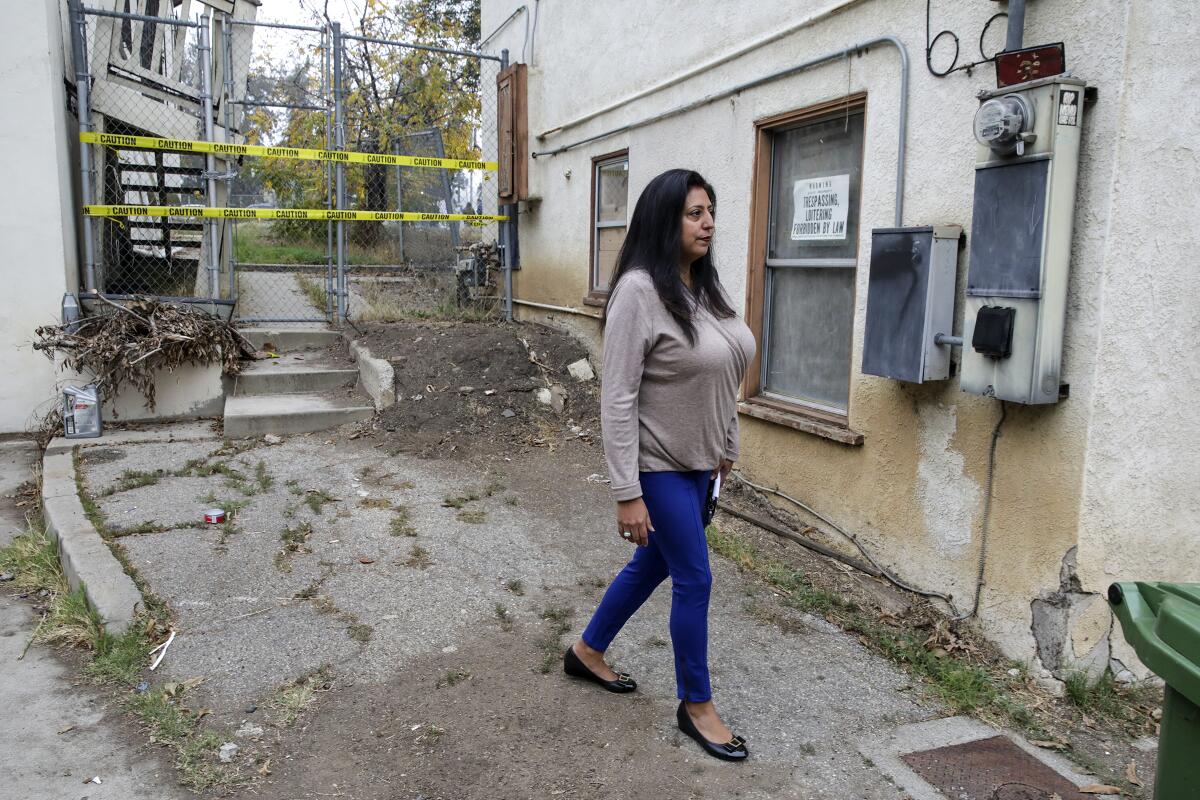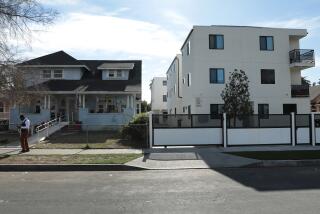60 years after being taken for abandoned L.A. freeway, homes may get new life

Six decades after California transportation officials began seizing hundreds of properties for a freeway project that never came, Los Angeles leaders have unveiled a proposal to replace the decaying vacant homes and dirt-filled lots in the El Sereno neighborhood with new parks and housing.
If the plan comes to fruition, it would be a major step forward in the saga involving the curtailed 710 Freeway, which hit a wall of opposition before it could stretch into wealthier communities.
The Eastside neighborhood has long borne the most visible and lasting scars of the abandoned project, with a high concentration of derelict homes left in its wake. As the COVID-19 pandemic hit, activists repeatedly tried to take over vacant homes in a reaction to the region’s affordable housing crisis.
“The time is finally here to restore the community of El Sereno and make it whole again,” said Los Angeles City Councilman Kevin de León, who represents the neighborhood, at a Friday morning news conference introducing the plan.
The city’s proposal is just one part of what remains a lengthy process to end the disruption in El Sereno and neighboring South Pasadena and Pasadena that began in the 1950s. Back then, the communities were in the pathway of what was to be the final connection in the 710 Freeway that stretches from the region’s commercial ports in Long Beach through the San Gabriel Valley. But litigation and political pushback blocked construction and the project was finally officially killed three years ago, leaving a 4½-mile gap in the freeway between Alhambra and Pasadena.
Left in limbo were hundreds of homes acquired by the California Department of Transportation, ranging from modest residences in El Sereno to Craftsman mansions on stately streets in South Pasadena. Most famously, Caltrans real estate portfolio includes the 110-year-old Pasadena childhood home of chef Julia Child, which has been vacant for 35 years.
The agency notoriously mismanaged the properties over decades, with tenants complaining of rodent and mold infestations and other homes allowed to fall into such disrepair that they became uninhabitable.
The city’s plan would turn crumbling empty houses and fenced-off parcels that are sprinkled amid the tidy bungalows and small apartment complexes in El Sereno into 252 new or rehabilitated homes or apartments alongside pocket parks and short hillside trails.
The proposal lightly increases the number of homes in the neighborhood, with efforts to add accessory dwelling units or backyard homes on single-family parcels and apartment construction confined to larger lots on the neighborhood’s edge. A dusty corner property marred by cracked concrete, where officials held Friday’s news conference would become 16 apartments with a retail business or café on the bottom floor.
All the housing would be for low- or middle-income tenants or homeowners. Officials and community members said the proposal will provide a bulwark against gentrification in El Sereno.
“We have a chance, a real chance to restore the community in a way that makes sense,” said Lisa Mauricio, 45, an El Sereno homeowner who helped develop the city’s plan. “We welcome the new families that will be joining us.”
The proposal, however, is far from becoming a reality.
State law requires Caltrans to sell those properties to affordable housing developers via a competitive bidding process , and the city effort essentially amounts to one offer. Helping out is a requirement that the state sell the properties at their original purchase prices from the 1960s. So some parcels that could be worth hundreds of thousands of dollars on the open market will be offered for around $30,000.
The city has set aside $2.5 million for 77 vacant homes and lots in El Sereno, which De León believes will be enough to buy all of them.
Caltrans officials expect to begin selling off the properties next year.
De León, who was joined by the community’s state legislators — Democratic Assemblywoman Wendy Carrillo and Sen. Maria Elena Durazo — at the news conference, said it’s vital for all the vacant properties to be sold all together so the city can execute the plan in its entirety.
The city plan does not call for acquiring homes now occupied by long-term tenants nor those in South Pasadena and Pasadena, all of which have separate sales processes.
There is likely to be at least one competing bid in El Sereno, however.
A group representing about 400 families living in Caltrans-owned housing along the 710 corridor is planning to create a community cooperative that also wants to take control of the properties, said Roberto Flores, a member of United Caltrans Tenants.
The organization wants to form a land trust to ensure that homes would remain affordable to prospective homeowners and tenants, he said, with any increases in real estate values funneled into building wealth for the entire neighborhood.
Flores said the group is still developing its proposal for the properties, but that it would also likely include a mix of single-family homes, smaller backyard units, apartments and parks.
“What’s important here is not so much what they’re going to build but who’s going to control it,” Flores said, criticizing the elected officials for not coordinating with the organization. “How are they going to allow for community participation in the management of all these houses?”
Flores also was frustrated that the city efforts didn’t recognize actions by members of the tenant group that upped public pressure to house people in the vacant homes.
In March 2020, just as government stay-at-home orders to combat the COVID-19 pandemic were beginning, a group of homeless and housing insecure Angelenos broke into some of the homes with the intent of staying. Facing demands to open up the properties, the state leased 26 previously vacant units to the city as temporary residences, and about a dozen families that entered homes last spring remain there now, city officials said.
A second organized attempt to take over more the day before Thanksgiving 2020 erupted in chaos as activists clashed with California Highway Patrol officers who in some cases violently removed those who had broken into another 19 homes.
The drama over the 21 months was only the latest chapter in decades of tussles over what the freeway plans wrought.
The cities of Alhambra and South Pasadena waged a vitriolic political battle over whether the freeway extension should happen at all. Those in Alhambra argued that they were left to deal with the disruption and vehicle exhaust from freeway traffic that ended in their city because of wealthier South Pasadena’s opposition to the 710 cutting through their city.
A Caltrans official once described the intercity squabbling as “like the Hatfield and McCoys.”
At one point, building the longest continuous highway tunnel in the U.S. by digging underground was floated as a possible solution to the gap in the freeway. Ultimately, federal officials rescinded their approval for the project and local leaders redirected hundreds of millions of dollars earmarked for its construction to other efforts.
The project’s death in 2018 coincided with the state’s growing affordable housing problems, so attention quickly shifted to the fate of the Caltrans-owned properties. The effort to sell them off also has been marred by political dysfunction and bureaucratic red tape. Last year, a state bill to reduce regulations surrounding the sale of the homes failed because lawmakers didn’t bring it up for a vote before the deadline for passage expired.
On Friday, De León said it was time to get past all those problems.
“We can turn a dark period into a wonderful period for all of the residents of El Sereno,” the councilman said.
Watch L.A. Times Today at 7 p.m. on Spectrum News 1 on Channel 1 or live stream on the Spectrum News App. Palos Verdes Peninsula and Orange County viewers can watch on Cox Systems on channel 99.








